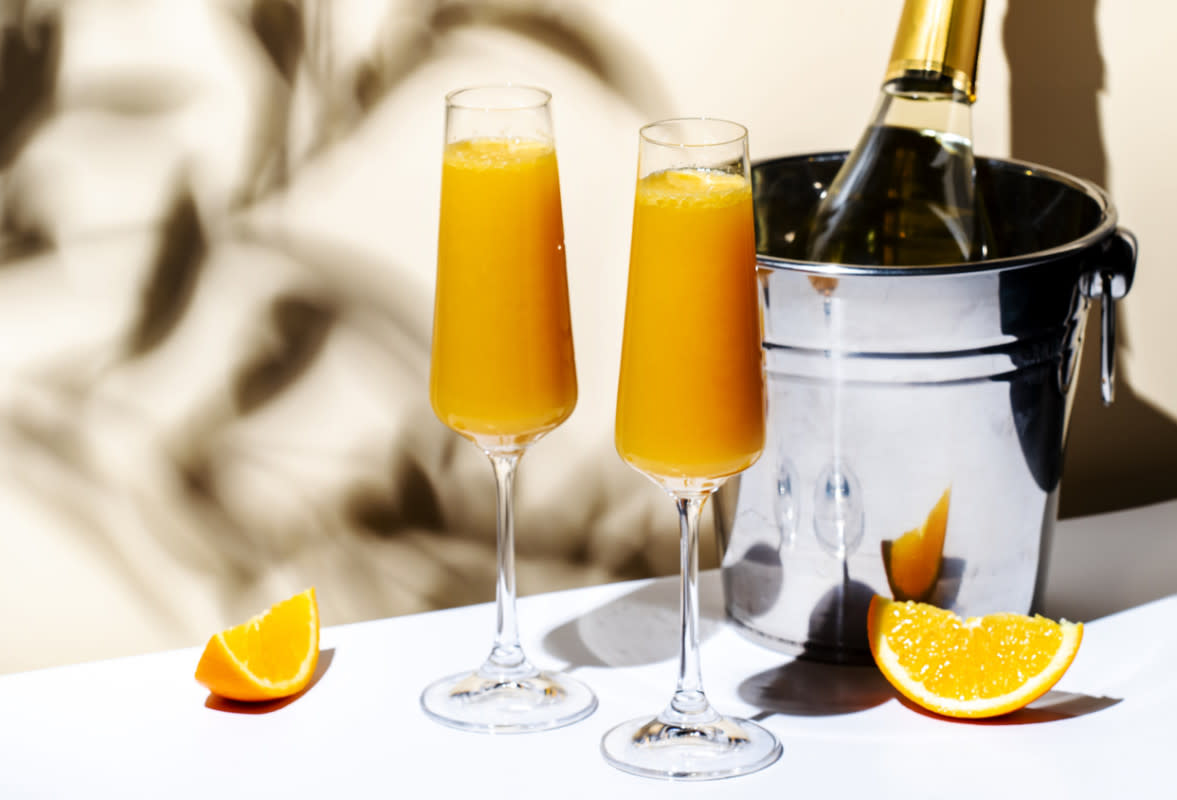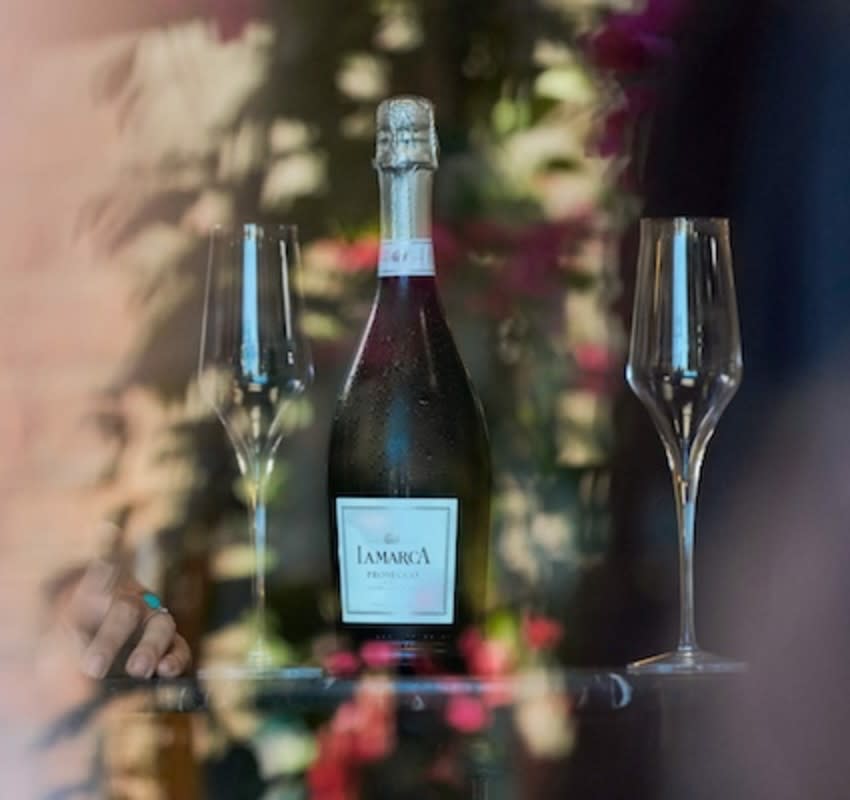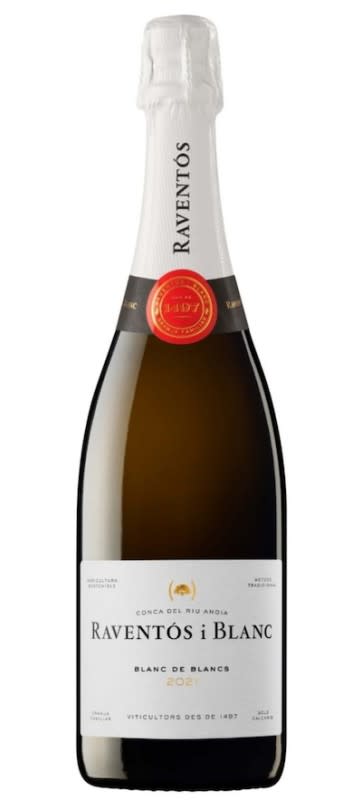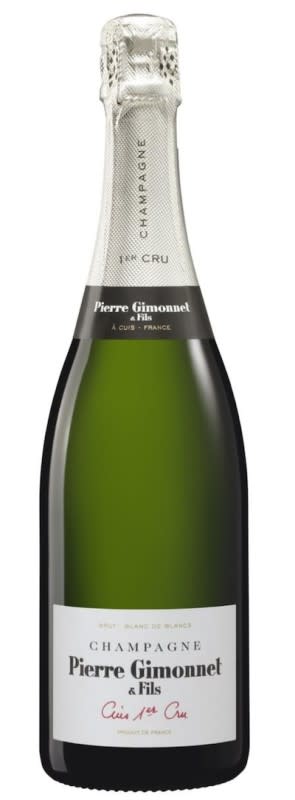Wine Experts Weigh in on the Best Champagne for Mimosas, Just in Time for Mother's Day Brunch

Mimosas with Champagne bucket
With apologies to the Bloody Mary, brunch and mimosas go hand in hand. The bubbly orange juice cocktail is synonymous with the late-morning, early-afternoon meal in which you and your pals channel your inner Carrie Bradshaw and Co. (or for toasting your mom on Mother's Day).
Champagne is often considered the vino of choice for these bubbly cocktails, partly because, like brunch, the wine is a catch-all for bubbly.
"Champagne has received what I call the Kleenex effect, meaning that the end consumer calls everything that sparkles Champagne, while styles, quality, and price the world over can vary wildly," says Chimene Macnaughton, the beverage director for Honest Man Hospitality, which includes East Hampton mainstay Nick & Toni's.
Yet, not all that sparkles is Champagne. Other bubbly options, like Prosecco and Cava, are also good choices for your brunch cocktail. But are they a better fit for mimosas? It's a good question. Mimosas only have two ingredients, which, in theory, makes them simple.
"Even the simplest highballs, which hinge on the proper ratio of just two ingredients, need the correct balance between the two to make that magic," Macnaughton says. "The most obvious example might be a gin and tonic, where too much gin screams out over the muted tonic... I absolutely think about mimosas in this way."
So what's the best Champagne for mimosas? Or should you skip the Champagne entirely? We quizzed Macnaughton and Melissa Helfand, the general manager at The Duck & The Peach in Washington, D.C. to get the best bubbly advice for your next brunch cocktail.
Related: We Asked a Floridian to Taste & Rank 11 Orange Juice Brands and the Winner Surprised Him
What is Champagne?
The first thing to note is that not all bubbly wine is Champagne. "Champagne is a sparkling wine that comes from the Champagne region in France. It's made using a specific method called méthode champenoise, where the second fermentation, which creates the bubbles, occurs in the bottle," explains Helfand. "It's typically made from a blend of Chardonnay, Pinot Noir and Pinot Meunier grapes."
Though Champagne has a specific definition, it's not a one-size-fits-all sipper. "Styles, quality and price...can vary wildly," Macnaughton says.
Related: The 33 Best Wines at Costco
What is Cava?
Like Champagne, Cava gets its name from a geographical locale. "Cava is a place in Spain's Catalonia, mostly in the Penedès, just 30 minutes west of Barcelona," Macnaughton says.
Cava is legally protected with a designation of origin, which means that a product has been produced, processed and developed in a specific location. Macnaughton also explains that Cava can only be made with specific grapes indigenous to the region: Xarel-lo, Macabeo and Parellada. Macaughton says Cava also uses the méthode champenoise, which gives it its fizz.
Related: 9 Popular Costco Liquors, Ranked From the Bottom(s) Up
What is Prosecco?
"Prosecco is an Italian sparkling wine from the Veneto region, made primarily from the Glera grape," Helfand says.
Prosecco may be a bubbly, but it's distinct from Champagne and Cava. "Prosecco is usually produced using the Charmat method, where the second fermentation happens in large steel tanks, making it lighter and fruitier," Helfand says.
Related: Wait, What's the Difference Between Mezcal and Tequila?
What Is The Best Wine to Use For Mimosas?
Now that we're clear about some of the most common sparkling wine options, what do the experts recommend for the best mimosa? "The best is always what you and your guests find most delicious," Macnaughton says.
OK, but what do wine experts love?
"The best sparkling wine for mimosas is typically one that is dry but not too complex or pricey, as the nuances of an expensive, high-quality wine can be lost when mixed with orange juice," Helfand says. "Prosecco is a popular choice, and my favorite, because it is fruity and can be a bit sweeter, which complements the acidity of the orange juice well."
Related: This Brunch Board Is an Unforgettable Make-Ahead Spread
Wait, But What About Champagne?
Of course, you can use Champagne in your mimosa — in fact, Macnaughton and her peers often choose it during tastings.
"For us, professional wine buyers and tasters all, Champagne is always the answer, but we love going to the ends of the literal wine-growing earth to find a fantastic sparkler to trick fellow tasters with as a Champagne stand-in, and loads of these wine finds can and do make an excellent mimosa," Macnaughton says.
So why not use Champagne if it's what wine experts technically adore?
"The basic answer is price, as Champagne is still thought to be a celebration or special occasion-based wine for most Americans," Macnaughton says.
Helfand agrees that the price point is often why people suggest skipping the Champagne for making mimosas. "Using a more affordable but high-quality Prosecco or Cava can achieve excellent results without sacrificing the nuances of a fine Champagne," she says.
Related: 15 Impressive Brunch Recipes Anyone Can Make
Best Bottles of Champagne (and Other Bubblies) for Mimosas
To help you make some choices at the liquor store, we asked Helfand and Macnaughton to suggest some specific bottles. If your store doesn't have these, ask if they carry something similar.
Prosecco: La Marca Prosecco

La Marca Prosecco
Price and taste make La Marca a winning combo in Helfand's book. "This Prosecco is affordable and widely appreciated for its light, refreshing style with a touch of sweetness, making it a perfect match for mimosas," she says.
Cava: Raventós i Blanc Conca Del Riu Anoia Blanc de Blancs 2021

Wine.com
This Cava pairs well with your OJ of choice.
"I love that this wine is a 'Blanc de Blancs,' or white from white, giving it a precise crispness that carries through even the pulpiest of OJs," Macnaughton says.
Champagne: Pierre Gimonnet 1er Cru Blanc de Blancs Brut NV

Wine.com
If you're going to use Champagne in a mimosa, go all out.
"It's absolutely overkill, but if you must, then try supporting the grower-producer families of Champagne who make far less wine than the big houses - exceptional standards on a much smaller scale," Macnaughton says. "If you shop indie wine retailers, you can often find overlooked values, even grower Champagnes on sale. I say this with as much gravity as I can muster: not nearly enough people drink nearly enough bubbles."
Sources
Chimene Macnaughton, beverage director for Honest Man Hospitality
Melissa Helfand, general manager at The Duck & The Peach in Washington, D.C.

